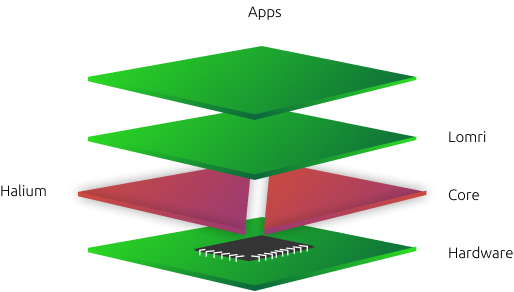
Core UT OS

Under the hood
Modern ports of Ubuntu Touch rely on Halium, an open-source project that unifies the Hardware Abstraction Layer for GNU/Linux on Android devices. This integration allows Ubuntu Touch to run on Android hardware, making the porting process more efficient and versatile. All new ports of Ubuntu Touch are based on Halium.
Lomiri, our desktop environment, is optimized for both mobile devices and desktops, built on the foundation of Unity 8. While it's tailored for seamless phone and desktop use, the desktop version is still in development and not yet ready for full production.
Lastly, there's the app layer, which supports both native Linux applications and Android applications through Waydroid.
The Application Layer
The Application Layer supports many different kinds of application frameworks, allowing developers the freedom to use the tools and frameworks that they want.
Whether you use Qt, Electron or SDL, you can be sure that it will work in Ubuntu Touch. We support all major application frameworks.


The Middleware Layer
The middleware layer powers Ubuntu Touch with essential services. Think of geographic data for apps, user account management and content sharing between applications. Trust Store manages trusted certificates and security credentials, while the Telepathy framework handles chat, voice and video calls. PulseAudio manages audio playback and recording, and BlueZ handles all Bluetooth connectivity. Lastly, the EDN steamlines event notifications.
The Base Platform
Ubuntu Touch integrates essential system components to make sure that the operating system runs efficiently.
The foundation leverages glibc for core C libraries, Hybris for Android driver compatibility and upstart for efficient system initialization. The Mir display server handles graphical output while D-bus facilitates interoperability between processes.

Project Steering Committee:
-
UBports Foundation, Marius Gripsgård